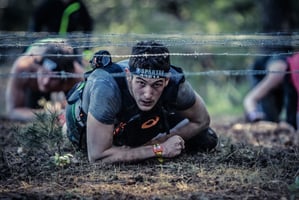When looking at the label of collagen supplements, knowing which information is important and which...
Is Collagen REALLY Good for You?

Many health trends come and go, so it can be hard to know which supplements, diets, or health plans will really work for your body and lifestyle. Is keto the way to go? Should you try intermittent fasting? Is collagen good for you?
The questions are endless.
As the medical world becomes more aware of the power of nutrition, natural supplements have become more relevant and applicable for numerous reasons. Still, that doesn’t stop many consumers from wondering which supplements will actually show real results.
We’re here to set your mind at ease, and help you see the numerous ways collagen really is good for you.
Collagen peptide proteins are one of the most popular natural supplements on the market today - and that is for a good reason. However, not all supplements or supplement companies use the same ingredients, and therefore not all collagen supplements are created equal.
To answer the question: “Is collagen good for you?” We have to dig deeper into the science behind collagen and how it interacts with your body when you use it.
What is collagen made of?
Collagen is the most prevalent protein in the human body and makes up the structural supports of your bones, joints, ligaments, skin, and other connective tissues. Collagen plays an integral role in your overall bodily health, but the amount of collagen your body naturally produces decreases as you age.
Your body synthesizes collagen through amino-acids, which are the building blocks of all types of proteins. These amino acids bind together to form elongated triple helix fibrils. They are complex structures that are capable of building extremely strong, flexible connective tissues.
When we talk about collagen in the body, we are usually talking about the whole collagen proteins. However, when we talk about collagen supplements, we are generally referring to collagen peptides.
Collagen peptides are the individual collagen molecules that combine to make up full-length collagen structures. Collagen peptides are the ideal supplement for medical, nutritional, or physical recovery because when the collagen is broken down into smaller pieces, it is more bioavailable to your body.
Essentially, collagen peptides are amino-acid protein structures taken from the collagen strands. Collagen molecules contain over 1,000 amino acids, so it is extremely difficult for your intestinal and stomach pores to digest collagen molecules in the full amino acid structure.
Collagen peptides, although deconstructed, still provide the necessary building blocks your body needs to construct collagen once absorbed. To produce collagen peptides that are bioavailable and easily digestible, collagen must go through the process of hydrolysis.
So, you may notice that some collagen peptides will also be labeled as (or referred to as) hydrolyzed collagen. This means that the whole collagen molecule has gone through hydrolysis to break the collagen into smaller, more digestible pieces.
Why is collagen good for you?
Collagen is an essential protein structure in your body. It is vital to your skin health, joint structure, and muscle performance, among other things.
Since collagen production starts to slow down with age, it is no wonder that you may begin to feel some aches and pains in your joints, or that it may take longer than it used to to heal from a wound or hard workout.
Because collagen is such an integral aspect of your bodily movement and functioning, it is easy to start to see why collagen is good for you. There are so many different applications and potential benefits of collagen, so we picked five of our favorite reasons that collagen is good for you.
1. Collagen may improve skin health
One of the most popular reasons why collagen is good for you is the potential it has to improve the appearance and elasticity of skin.
A large percentage of the studies that have been conducted to test the effectiveness of collagen supplements center around anti-aging skin benefits and medical applications.
From some of the results in these studies, it is believed that collagen supplementation has the potential to improve skin elasticity, hydration, and cell recovery. Many of these studies were conducted using oral collagen supplements, not topical creams.
While topical collagen is good for your skin, you can see even better benefits when you take a collagen supplement.
2. Collagen could help with muscle recovery
There is also some evidence to suggest that certain types of collagen, like hydrolyzed liquid collagen ProT Gold, may improve recovery time for athletes. That's because collagen's protein structure is literally what is holding our bodies together.
Collagen is a vital part of your muscle and joint structures, meaning that if you provide more collagen for your body to use, the easier it is to build muscle and recover after hard workouts.
A 2015 study suggests that collagen helped the athletes in the study to recover faster and have more connective tissue protection during routine resistance and cardiovascular exercises and training.
This makes sense because just as collagen is good for your skin elasticity, it also has the potential to contribute to your muscle strength and elasticity-- therefore improving your overall recovery time after a workout and general muscle functioning during exercise.
3. Collagen may help with wound and injury recovery
Similarly to how collagen may improve muscle function and recovery time, collagen is good for you if you are dealing with wound or injury recovery of any kind.
Wounds on the surface of your body, usually on your skin, need new cells and proteins like collagen to build back up and heal.
When taking a collagen supplement, your body is able to direct the resources of that collagen to the area most in need. That means it will go to the injured part of your body whether it be your skin, an organ, or a joint.
Once there, the collagen can break down into the amino acid structures to be divvied up, applied, and reconstructed into collagen proteins your body needs to recover.
Since as you age, you are no longer producing as much collagen, it takes your body longer to produce and collect the amino acids necessary to repair structures like cartilage. This decrease in production is where natural collagen supplements come into play.
Collagen is good for you during recovery because it can help you heal more quickly and get back to the things you love.
4. Collagen can be used for medical nutrition therapy
Since collagen is a dietary supplement, it is no surprise that there has also been some interest in exploring the application of collagen in medical nutrition therapy. It could be that collagen is good for you if you are leaving with a chronic issue.
In short, medical nutrition therapy is nutritional counseling to treat injuries, chronic health conditions, and illnesses through diet and nutrition. It has the most application when it comes to treating illnesses and diseases like heart disease, diabetes, or even malnutrition.
5. Collagen has other medical applications
The applications of collagen are vast and stretch far beyond a nice skin complexion. Not only is collagen good for your skin health and improving your appearance, there are also various medical uses for collagen, including post-surgery recovery, cosmetic surgery, and more.
Because collagen is such an important structural part of your body, when it comes to healing from an injury of any kind, grafting skin, or even healing cartilage, you need collagen to make those repairs for you. Over 4,000 medical facilities use proT Gold Liquid Collagen for this very reason.
Beyond using collagen as an oral supplement, collagen can be used to reconstruct parts of your organs like your heart. Collagen can be used for dental plugs, and is even used as corneal shields during some eye surgeries.
Is collagen safe to take as a supplement?
There is some skepticism surrounding how safe collagen is, or how safe any natural supplement is for that matter. This is largely because the FDA does not regulate most supplements.
Any time you make a major change in your diet, it is best done with the consultation of a medical professional (or through medical nutrition therapy) to ensure you are getting the proper nutrition for your body - and that it won't interact with preexisting conditions or medications.
That said, collagen is a natural supplement and product that is derived from animal sources. And since collagen is a naturally occurring protein in the human body, there are very few health concerns surrounding how collagen interacts with your body.
The biggest risk of using a collagen product of any kind is where you are buying the product. To be on the safe side of things, make sure that you are getting a collagen supplement from a reputable company transparent about their sourcing and ingredients.
You still may be wondering if collagen is good for you to take daily, even if it is a natural supplement.
The short answer is a resounding YES.
Collagen is considered safe to take daily as long as you take the proper dose. Knowing how much collagen is good for you to take per day will depend on the application and your overall health/body weight.
Since collagen is the most abundant protein in your body, it plays a vital role in maintaining connective tissue health. And because collagen is a protein that you already produce, it is believed that there is potentially minimal risk in integrating it into your diet.
Not all collagen supplements are created equal
As with most natural supplements, collagen can be found in many different forms. The most common forms of collagen supplements are powder or liquid, although there are still some capsule forms available.
Many consumers have found that liquid collagen supplements are easier to use because you don't need to mix them with anything. Some powder collagen supplements have difficulty dissolving in cold liquids-- they often clump up.
ProT Gold Liquid Collagen is a complete protein option made from hydrolyzed collagen peptides. This makes it not only fast and convenient to use but easy for your body to digest and absorb.
As mentioned in the last section, beyond looking at the form of collagen and the collagen molecules' size, it is also important to know if the collagen you are drinking daily comes from a reputable brand.
The FDA classifies ingestible collagen as "generally recognized as safe (GRAS)." This means that as long as you purchase a collagen supplement from a brand with clear and transparent manufacturing and ingredients, collagen is good for you and generally considered safe.
ProT Gold is recognized by the FDA as a medical food and trusted by over 4,000 medical facilities, making it one of the most reputable sources of collagen on the market today. Our supplements have been medically tested for effectiveness and to ensure there aren't any adverse side effects.
We hope by now we have fully answered the question: “Is collagen good for you?”
The answer is 100% yes!
Collagen is good for you for so many reasons, from speedy surgery recovery, to its seemingly-magical anti-aging properties.
So, if you’ve been skeptical until now that collagen is good for you, we hope we’ve opened your eyes to this life-changing supplement, and enticed you to try out a hydrolyzed collagen supplement for yourself. Your body will thank you.




